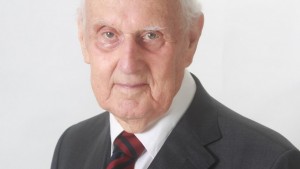A ‘natural leader and inspiration’ who became a black belt in karate at 57 and started running marathons in his 60s
Annemarie Evans@SCMP
Deric Daniel Waters was born in November 1920 in the east county of Norfolk in England after his father returned from the first world war.
An avid gymnast, he would describe climbing to the top of a large walnut tree in the centre of the market town of Watton, where he grew up, to poke a British flag out of the top to mark King George V’s jubilee in 1935.
Waters had a younger sister, Olga, and the family ran a construction firm set up in 1853. In the late 1930s he volunteered to go to war.
Waters was shipped to North Africa, a “Desert Rat” in the 8th Army for the second battle at El Alamein under Lieutenant-General Bernard Montgomery against the German and Italian armies. He later fought at the Battle of Salerno in southern Italy.
Waters was injured three times due to landmines and retained metal in his body from the shrapnel, which used to confuse X-ray technicians in more recent years. He was mentioned in despatches.
Waters met his first wife in Italy and their son, Barry, was born in 1946. He later applied to the Colonial Service, and arrived in Hong Kong in 1954.
He worked as an education officer at the Morrison Hill Technical Institute, where he later became the principal.
As a government employee in his 30s, Waters was required to join the Auxiliary Police and turned out for the riots in Shek Kip Mei in 1956 as a special constable.
At the institute he met mature student Vera Chan, the founder of Hong Kong’s first beauty and charm school, and they were married in 1960.
Waters wrote a book titled Understanding Technical English, “a bit dry” but it sold more than a million copies. He was involved in building up technical education in the city and helped with five institutes which later became part of Hong Kong Polytechnic University.
Aside from his work, Waters remained remarkably fit. At age 57 he’d already become a black belt in karate.
On a bookshelf in his study is a photo of Waters around that age doing a one-handed handstand. At age 62, he started running marathons.
“The Macau Marathon was my first. I was always the oldest person running,” he told the Sunday Morning Post last year.
Lee Ho-yin, associate professor in architectural conservation at the University of Hong Kong recalls Waters, who was a guest lecturer, arriving at his office when he was in his early 80s, 14 years ago.
“He was in full running gear and drenched in sweat. He had just finished a marathon and thought he’d pick up the teaching schedule on his way home.”
Waters studied for a doctorate, and was an avid member and later president of the Royal Asiatic Society here. He wrote several books including One Couple, Two Cultures about Western-Chinese marriages. Over the past 15 years he was a regular contributor to RTHK’s weekend Hong Kong Heritage programme.
Tim Luard, author of the wartime account, Escape from Hong Kong, described Waters as “a lovely man with one of the world’s best memories” who helped him with research.
“Dan was a natural leader and an inspiration to work with,” says Michael Broom, the current RASHK president. “As another famous old soldier once said: ‘Old soldiers never die, they just fade away;’ so it will be for all of us who had the privilege of knowing Dan.”
Waters leaves wife Vera, son Barry and his wife Christina, and two grandchildren.
